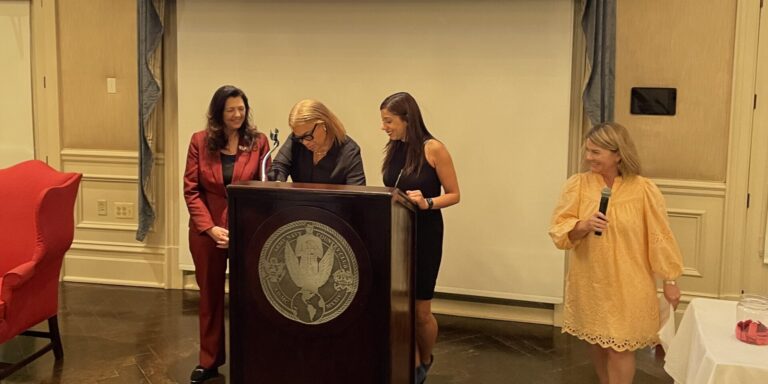Year after year, military spouse employment is a top concern. Even with all the resources available, the spouse unemployment rate is four to six times the national average, and many barriers keep military spouses from finding their place in the job world. The National Military Spouse Network reported in their 2021 Roadmap to Employment Stability for Military Spouses that “data collected since the COVID-19 pandemic indicate unemployment rates may have increased to 30 – 35%.”
The 2021 Blue Star Families Military Family Life Survey supports this fact. In the results, military spouse employment is again a top-five military life issue for nearly half (43%) of active-duty spouse respondents and a quarter of active-duty service member respondents (25%).
Why is it so hard?
According to the BSF survey, military spouses face particular barriers when looking for employment, which include their service members unpredictable schedule, expensive child care, and the amount of time out of the workforce due to numerous relocations. In some cases, state licensing requirements can be challenging to obtain.
Instant Teams Chief People Officer Erica McMannes gave insight on why military spouses struggle. “There is a lot of information out there, and it can be an overwhelming process, in addition to the barriers listed earlier,” said McMannes. “Potential employees may be limited by the time they have and the unique demands they face and education, skills, or labor gaps. A combination of any of these factors basically forces candidates in a corner, so they take whatever job they can that just fills a current need.”
Military spouses can be some of the most educated individuals. According to a Department of Labor facts sheet, 89% have some college education. 30% have a four-year degree, while 15% have an advanced degree. 31.6% of military spouses are employed part-time but may prefer full-time work, according to the DOL. Even though spouses are highly qualified, many are underemployed.
“I don’t think it is hard to find reputable employment; the issue is that sometimes military spouses aren’t valued for reputable employment,” said Denise Lewis, VetJobs and Military Spouse Jobs Senior Lead, Diversity, Equity, and Inclusion Director and Outreach Specialist. “Recruiters often look at a military spouse’s resume and discount them because of gaps in their resume.”
Since job choices can be limited for military spouses due to lack of flexibility in location and schedules, many spouses can find what looks like a guaranteed position but ultimately find themselves in the middle of a lie. “Unfortunately, our community can often also be a target for scams,” said McMannes. “It’s why I am also passionate about educating spouses on red flags for employment scams!”
Pandemic employment woes
As if finding a decent job wasn’t hard enough, a global pandemic made it even harder for military spouses to find work. COVID-19 was a barrier to employment in the BSF survey. With school and child care facility closures, many spouses had to turn to the job of teacher and caregiver.
“I think that after the pandemic military spouses face some of the same challenges,” said Lewis. “During the pandemic, children were at home, and spouses had to balance teaching and parenting. Post pandemic, I believe childcare is still a factor. Many spouses have shared staying out of the job market because of high childcare costs.”
While the pandemic had adverse effects military spouse employment, many employers have added remote work opportunities or hybrid options. The openness to shifting to remote work after COVID-19 has dramatically changed the outlook of military spouses keeping their jobs wherever they move to or obtaining new employment. Nearly half of the active-duty spouses that responded to the BSF survey stated that remote work opportunities would best address any employment concerns.
Information saturation
While resources are abundant for military spouses, it can be overwhelming to decide what to trust or how to apply. “It can be challenging navigating them all and figuring out what works best for that specific military spouse,” said McMannes.
“It can be very overwhelming because there are so many resources out there,” said Lewis.
Fortunately, there are resources available for military spouses no matter what part of the employment journey they are in. McMannes’s company, Instant Teams, helps connect spouses to remote positions with numerous companies. “Instant Teams is different in that we offer remote career opportunities based on their skills and desired work-life balance; a job they can take anywhere regardless of permanent change of station (PCS),” said McMannes.
Lewis and her team at Military Spouse Jobs have made it a point to help military spouses with any aspect of the job hunt. “We provide one on one personalized services, upskilling, Linkedin Optimization, Salary Negotiations, Interview practice, and internal application access to our employer partners,” said Lewis.
There is hope
All is not lost for military spouses seeking employment. Resumes are the most crucial step in any application process. “If spouses could just focus on their knowledge, skills, and abilities, that would be a huge positive,” said McMannes. “Focus on articulating exactly the type of work you are looking for and why you’d be a great contribution to the employer.”
Lewis also had words of wisdom for military spouse job hunters. “Don’t give up,” said Lewis. “We are here to help you wherever you are in your career journey.”
Blue Star Families has launched their 2022 Military Family Lifestyle Survey. You can participate here until July 10, 2022. MilSpouseFest is a proud sponsor of the 2022 survey.


















